Would you mind的用法
mind的用法

●mind的用法n.头脑, 智力, 精神, 情绪vi.介意, 照顾, 留心, ▲Would/Do you mind+(sb's) doing...? Would youmind my/me smoking here? 回答:不介意:No,not at all./No. Of course not 介意:I'd rather you didn't ...I'm sorry.../Sorry.../You'd better not. ▲Do you mind if sb. does sth...? Do you mind if I smoke here? ▲Would you mind if sb. did...?(虚拟语气)eg: 1).Would you mind if I broke the news to your son? ★make up one's mind(s);下决心★change one's mind 改变主意★make up sb.'s mind 使某人下决心, 使某人打定主意★never mind 别难过;没关系;不重要★absence of mind:心不在焉★arise in one's mind/come to [into] sb.'s mind 浮上脑际, 涌现在头脑里★bear [keep] in mind 记住, 记在心里: ★bring [call] to one's mind 想起, 回忆起★with.... in mind 把....搁在心上★have sth/sb. on ones mind:老想着某事、人,老为某事、人担心。
)●minded: 有意的,倾向于…的:具有…头脑的。
常用于复合词evil-minded存心不良的;low-minded卑鄙的closed-minded:心胸狭窄的Ex of mind--brain1.Do you mind my taking this seat? ____. A, Yes,sit down please B. No, of course not C. Yes, take it please d. No, you can't take it. (90,B) 2.She made a silly mistake because she hadn'tkept her ____ on her work. A. head B. heart C.brain D. mind (D).3.Would you mind if I used your phone? A. Sure.go ahead. B. No, thank you. C. Yes, I would D.No, go ahead. (D)4.---Do you mind if I keep pets in this building?---____. A. I'd rather you didn't actually B. Of course not, It's not allowed here. C. Great! I love pets D. No, you can't (2000, 上海,A). 5.He didn't seem to mind ____ TV while he wastrying to study. A. them to watch B. that they watch C. their watching D. watching (C).6.Don`t believe him. He never has us _____A.in mindB.on mindC.in mindsD.to his mind (A。
Would(Do) you mind… 的用法详解

Do / Would you mind… 的用法详解一、基本用法Do / Would you mind… 的基本用法是表示请求允许或征求对方意见,Do / Would you mind…后面主要接动词的ing形式(doing)或if引导的条件状语从句,句首的Do也可换成Would,这样语气更委婉,意为“劳驾”“你可否……?”“请你做……好吗?”如:1.Do you mind…的例句Do you mind if I open the window? 我可以开窗吗?Do you mind helping us? 请你帮我们一下忙好吗?Do you mind if I switch the radio off? 我可以关掉收音机吗?Do you mind me talking to you like this? 你介意我这样同你说话吗?Do you mind if I sound you out about these new proposals? 我可以听听你对这个新计划的看法吗?2.Would you mind…的例句Would you mind changing places with me? 我们换换位子好吗?Would you mind speaking less quickly? 你可否别讲得那么快?Would you mind if I opened the window? 我可以开窗吗?Would you mind going to the chemist’s for me? 你愿为我跑一趟药店吗?Would you mind looking over my exercises? 请你帮我看一下我的练习好吗?二、搭配用法该句型的搭配应注意以下几点:1. 其后可接if 从句,但不接whether从句。
2. 其后可接动名词,但不接不定式。
如:Would you mind helping me? 请帮帮我的忙好吗?Do you mind my closing the window? 我关上窗户行吗?3. 可说Do you mind… 或Would you mind…,但不说Will you mind…。
谈谈“Wouldyoumind……?”句型

谈谈“Would you mind……? ”句型2019-09-03“Would you mind...?”句型是交际⽤语中常⽤句型之⼀。
“Would you mind...?” 意为“你介意做……吗?”,汉语常常译为“做……你不反对/介意吗?”,⽤来征询对⽅对某⼀件事的同意或许可,是⼀种⽐较客⽓的表达⽅法。
其⽤法有以下⼏点值得注意:1. “Would you mind...?” 的意思是“请你……好吗?”,常⽤来表⽰⼀种有礼貌的请求,后接动名词,不接动词不定式结构。
例如: Would you mind closing the door?请把门关上好吗?Would you mind giving me a glass of water?请你给我⼀杯⽔好吗?Would you mind opening the windows?打开窗户你介意吗?2. “Would you mind...?” 后接从句时,从句中的谓语动词常⽤过去时,表⽰委婉的语⽓。
例如:Would you mind if I closed the window?你介意我把窗户关上吗?Would you mind if I turned up the radio?我把收⾳机声⾳开⼤点,你反对吗?3. “Would you mind...?” 的否定式通常是在mind后⾯加not,与后⾯的动名词构成动名词的否定式。
例如:Would you mind not swimming in the river?请你不要在河⾥游泳好吗?Would you mind not being late again?请你不要再迟到好吗?4. “Would you mind...? ”的同义句型是“Do you mind...?”,两种句型意思相同,只是“Would you mind...?” ⽐“Do you mind ...?”语⽓显得更客⽓、委婉⼀些。
两者后接从句时,前者从句中的动词常⽤过去时,⽽后者从句中的动词则⽤⼀般现在时。
mind用法
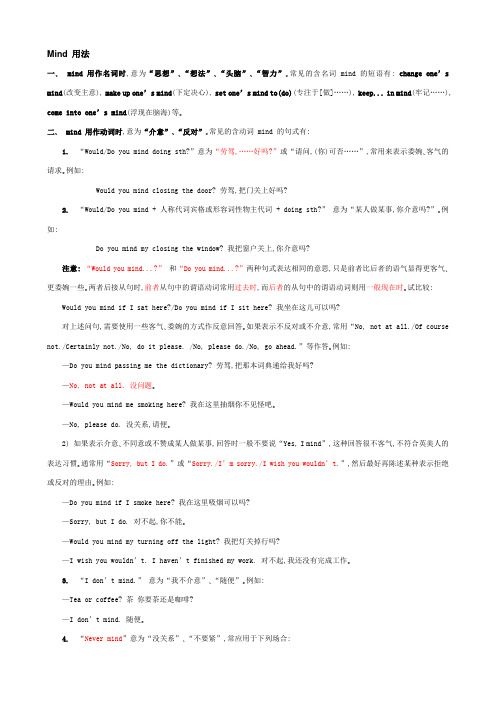
Mind 用法一、 mind 用作名词时,意为“思想”、“想法”、“头脑”、“智力”。常见的含名词 mind 的短语有: change one’s mind(改变主意), make up one’s mind(下定决心),set one’s mind to(do)(专注于[做]……), keep... in mind(牢记……), come into one’s mind(浮现在脑海)等。二、 mind 用作动词时,意为“介意”、“反对”。常见的含动词 mind 的句式有:1. “Would/Do you mind doing sth?”意为“劳驾,……好吗?”或“请问,(你)可否……”,常用来表示委婉、客气的请求。例如:Would you mind closing the door? 劳驾,把门关上好吗?2.“Would/Do you mind + 人称代词宾格或形容词性物主代词+ doing sth?” 意为“某人做某事,你介意吗?”。例如:Do you mind my closing the window? 我把窗户关上,你介意吗?注意: “Would you mind...?”和“Do you mind...?”两种句式表达相同的意思,只是前者比后者的语气显得更客气、更委婉一些。两者后接从句时,前者从句中的谓语动词常用过去时,而后者的从句中的谓语动词则用一般现在时。试比较: Would you mind if I sat here?/Do you mind if I sit here? 我坐在这儿可以吗?对上述问句,需要使用一些客气、委婉的方式作反意回答。如果表示不反对或不介意,常用“No, not at all./Of course not./Certainly not./No, do it please. /No, please do./No, go ahead.”等作答。例如:—Do you mind passing me the dictionary? 劳驾,把那本词典递给我好吗?—No, not at all. 没问题。—Would you mind me smoking here? 我在这里抽烟你不见怪吧。—No, please do. 没关系,请便。2) 如果表示介意、不同意或不赞成某人做某事,回答时一般不要说“Yes, I mind”,这种回答很不客气,不符合英美人的表达习惯。通常用“Sorry, but I do.”或“Sorry./I’m sorry./I wish you wouldn’t.”,然后最好再陈述某种表示拒绝或反对的理由。例如:—Do you mind if I smoke here? 我在这里吸烟可以吗?—Sorry, but I do. 对不起,你不能。—Would you mind my turning off the light? 我把灯关掉行吗?—I wish you wouldn’t. I haven’t finished my work. 对不起,我还没有完成工作。3. “I don’t mind.” 意为“我不介意”、“随便”。例如:—Tea or coffee? 茶你要茶还是咖啡?—I don’t mind. 随便。4. “Never mind”意为“没关系”、“不要紧”,常应用于下列场合:1) 回答对方的致歉。例如:—I’m sorry. I came in a hurry and forgot to bring food. 对不起,我来得匆忙,忘记带吃的了。—Never mind. You can have ours. 没关系,你可以吃我们的。2) 安慰对方。例如:—Did you watch the baseball match yesterday? 昨天你看棒球比赛了吗?—No, I missed it. By the time I got there, it had already finished. 没有,我错过了。当我到达那里时,比赛已经结束了。—Never mind. It was a boring match. 没关系。那是一场枯燥乏味的比赛。3) 回答对方的求助。例如:—Sorry to trouble you. 抱歉,麻烦您一下。—Never mind. What can I do for you? 没关系。我能为你做些什么呢?[链接中考]1. Would you mind_____more slowly? I can’t follow you.A. speakB. spokeC. spokenD. speaking2. Do you mind_____the radio a little bit? I am doing my homework.A. turning offB. to turn downC. turning downD. turning up3. —Would you mind opening the window?—_____.A. Of course, open itB. Not at allB. CertainlyC. No, don’t do it4. —Do you mind if I take the seat?—_____. It’s for a gentleman named Bill.A. Better notB. Never mindC. Of courseD. Not at all5. —It’s too hot. Would you mind my_____the window?—_____. Do it as you like, please!A. to open; OKB. opening; Certainly notC. closing; Of courseD. open; Good idea6. —Would you mind my smoking here?—_____.A. Not at allB. I have no ideaC. Yes, please7. Would you mind_____me how_____English words?A. tell; to rememberB. telling; rememberC. telling; to rememberD. tell; remember8. —Mary is ill. When shall we go to see her, tonight or tomorrow night?—_____. Either night is OK.A. I’m sureB. I’m afraid notC. I d on’t knowD. I don’t mind9. —I’m terribly sorry to have stepped on your foot.—_____.A. Don’t say thatB. Never mindC. You’re welcomeD. That’s right10. —Do you mind opening the door for me?—_____.A. Yes, of course notB. Yes, pleaseC. No, of course notD. No, you can’t open it Key: 1-5 DCBAB6-10 ACDBC(注:专业文档是经验性极强的领域,无法思考和涵盖全面,素材和资料部分来自网络,供参考。
wouldyouminddoing.的回答docx(可编辑修改word版)

would you mind doing.用什么回答1.“Would you mind doing...”句型常用于表示请求时,意思是“请你做……你是否介意?”“请你做……好吗?”是一种比较客气的表达方式.如:Would you mind turning off the light in the room?请你把房间里的灯关掉好吗?如果要表示“请你不要做……你是否介意?”“请你不要做……好吗?”只需要在doi ng前面加上not.如:Would you mind not standing in front of me?请你不要站在我的前面好吗?2.如果同意,表示不介意时,可用如下用语来表达:Certainly / Of course not./ Not at all./ No,not at all.如果不同意,表示介意时,常用“Sorry / I'm sorry.”(对不起)及陈述某种理由来表示拒绝或反对.如:—Would you mind going to the movies this evening?今晚去看电影好吗?—I'm sorry.But I haven't finished my homework yet.对不起,我的作业还没有完成.学习时还要注意:1.“Would you mind doing...”句型中的would也可用do代替,但语气较生硬,不如用would客气.2.“Would you mind doing...”句型中的逻辑主语只能是谈话的对方you.如果想要对方允许自己做某事,可用“Would you mind my doing...”句型,如:Would you mind my smoking here?你介意我在这里吸烟吗?。
wouldyoumind否定句
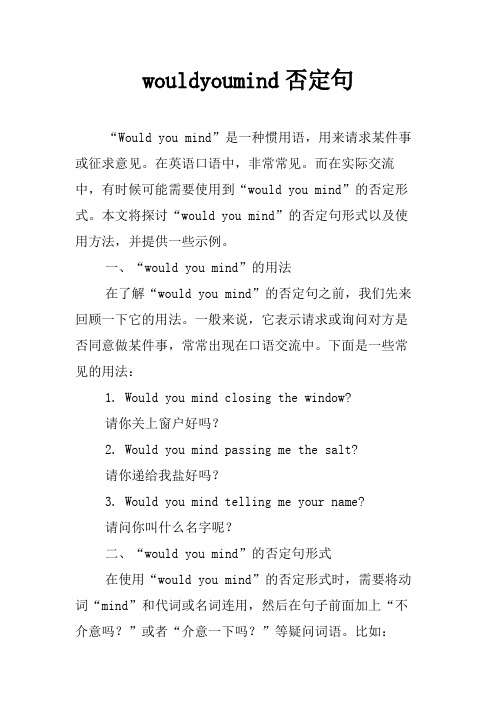
wouldyoumind否定句“Would you mind”是一种惯用语,用来请求某件事或征求意见。
在英语口语中,非常常见。
而在实际交流中,有时候可能需要使用到“would you mind”的否定形式。
本文将探讨“would you mind”的否定句形式以及使用方法,并提供一些示例。
一、“would you mind”的用法在了解“would you mind”的否定句之前,我们先来回顾一下它的用法。
一般来说,它表示请求或询问对方是否同意做某件事,常常出现在口语交流中。
下面是一些常见的用法:1. Would you mind closing the window?请你关上窗户好吗?2. Would you mind passing me the salt?请你递给我盐好吗?3. Would you mind telling me your name?请问你叫什么名字呢?二、“would you mind”的否定句形式在使用“would you mind”的否定形式时,需要将动词“mind”和代词或名词连用,然后在句子前面加上“不介意吗?”或者“介意一下吗?”等疑问词语。
比如:1. Would you mind not smoking here?(请不要在这里吸烟,介意一下吗?)2. Would you mind not making so much noise?(请不要制造那么多噪音,不介意吗?)3. Would you mind not interrupting me?(请不要打断我,介意一下吗?)三、“would you mind”的否定句用法示例1. Would you mind not wearing shoes inside the house?请不要在房子里穿鞋,介意一下吗?2. Would you mind not bringing your dog with you?请不要带狗来,不介意吗?3. Would you mind not talking so loudly?请不要讲那么大声,介意一下吗?4. Would you mind not smoking in the car?请不要在车里吸烟,不介意吗?5. Would you mind not using your cell phone in the library?请不要在图书馆使用手机,介意一下吗?四、总结“would you mind”是英语口语中非常实用的一种表达方式。
Wouldyoumind的用法和句型.
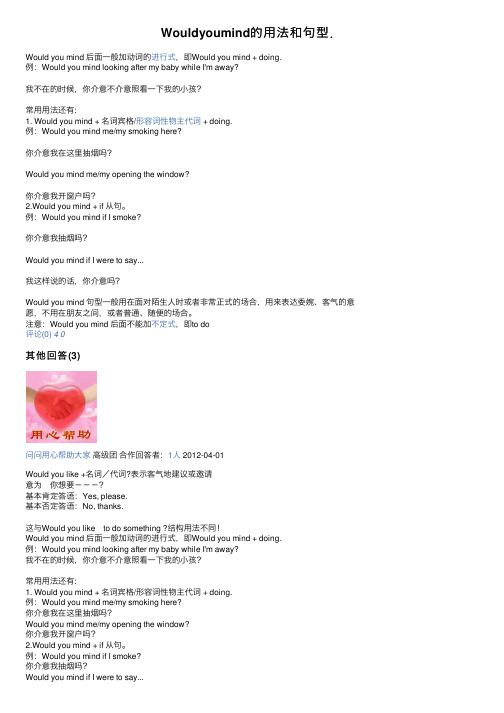
Wouldyoumind的⽤法和句型.Would you mind 后⾯⼀般加动词的进⾏式,即Would you mind + doing.例:Would you mind looking after my baby while I'm away?我不在的时候,你介意不介意照看⼀下我的⼩孩?常⽤⽤法还有:1. Would you mind + 名词宾格/形容词性物主代词 + doing.例:Would you mind me/my smoking here?你介意我在这⾥抽烟吗?Would you mind me/my opening the window?你介意我开窗户吗?2.Would you mind + if 从句。
例:Would you mind if I smoke?你介意我抽烟吗?Would you mind if I were to say...我这样说的话,你介意吗?Would you mind 句型⼀般⽤在⾯对陌⽣⼈时或者⾮常正式的场合,⽤来表达委婉、客⽓的意愿,不⽤在朋友之间,或者普通、随便的场合。
注意:Would you mind 后⾯不能加不定式,即to do评论(0)40其他回答(3)问问⽤⼼帮助⼤家⾼级团合作回答者:1⼈ 2012-04-01Would you like +名词/代词?表⽰客⽓地建议或邀请意为 你想要---?基本肯定答语:Yes, please.基本否定答语:No, thanks.这与Would you like to do something ?结构⽤法不同!Would you mind 后⾯⼀般加动词的进⾏式,即Would you mind + doing.例:Would you mind looking after my baby while I'm away?我不在的时候,你介意不介意照看⼀下我的⼩孩?常⽤⽤法还有:1. Would you mind + 名词宾格/形容词性物主代词 + doing.例:Would you mind me/my smoking here?你介意我在这⾥抽烟吗?Would you mind me/my opening the window?你介意我开窗户吗?2.Would you mind + if 从句。
透视Would you mind ...?的用法

透视Would you mind ...?的用法Would you mind ...?是一个非常重要的交际用语,用来表示委婉的请求,或用来表示希望得到对方的许可。
意为“劳驾”“你可否……?”“请你做……好吗?”。
学习此句型时应注意以下两点:一、结构1. Would you mind doing sth.表示希望对方做某事。
如:Would you mind closing the door?Would you mind helping me?注意:would可用do代替,只是用would 比do语气更委婉。
如:Would / Do you mind showing me the way to the airport?2. Would you mind one's doing sth. 用来表示请求允许或询问对方是否介意自己或别人做某事。
如:Would you mind my asking you a few questions? Would you mind my opening the window?注意:其中形容词性物主代词one's在口语中可用代词宾格担当动名词的逻辑主语。
Would you mind my/ me smoking here?3. Would you mind not doing ... ?否定式通常在doing的前面加not。
如:Would you mind not spitting everywhere? Would you mind not taking it?4. Would you mind +if从句。
用来表示请求对方是否介意某人做某事。
Would you mind if I took his place? Would you mind if I closed the window ?注意:在“Would you mind if 从句”句型中,从句谓语常用一般过去时,而“Do you mind if从句”句型中,从句谓语常用一般现在时。
mind用法

Mind 用法一、 mind 用作名词时,意为“思想”、“想法”、“头脑”、“智力”。常见的含名词 mind 的短语有: change one’s mind(改变主意), make up one’s mind(下定决心),set one’s mind to(do)(专注于[做]……), keep... in mind(牢记……), come into one’s mind(浮现在脑海)等。二、 mind 用作动词时,意为“介意”、“反对”。常见的含动词 mind 的句式有:1. “Would/Do you mind doing sth?”意为“劳驾,……好吗?”或“请问,(你)可否……”,常用来表示委婉、客气的请求。例如:Would you mind closing the door? 劳驾,把门关上好吗?2.“Would/Do you mind + 人称代词宾格或形容词性物主代词+ doing sth?” 意为“某人做某事,你介意吗?”。例如:Do you mind my closing the window? 我把窗户关上,你介意吗?注意: “Would you mind...?”和“Do you mind...?”两种句式表达相同的意思,只是前者比后者的语气显得更客气、更委婉一些。两者后接从句时,前者从句中的谓语动词常用过去时,而后者的从句中的谓语动词则用一般现在时。试比较: Would you mind if I sat here?/Do you mind if I sit here? 我坐在这儿可以吗?对上述问句,需要使用一些客气、委婉的方式作反意回答。如果表示不反对或不介意,常用“No, not at all./Of course not./Certainly not./No, do it please. /No, please do./No, go ahead.”等作答。例如:—Do you mind passing me the dictionary? 劳驾,把那本词典递给我好吗?—No, not at all. 没问题。—Would you mind me smoking here? 我在这里抽烟你不见怪吧。—No, please do. 没关系,请便。2) 如果表示介意、不同意或不赞成某人做某事,回答时一般不要说“Yes, I mind”,这种回答很不客气,不符合英美人的表达习惯。通常用“Sorry, but I do.”或“Sorry./I’m sorry./I wish you wouldn’t.”,然后最好再陈述某种表示拒绝或反对的理由。例如:—Do you mind if I smoke here? 我在这里吸烟可以吗?—Sorry, but I do. 对不起,你不能。—Would you mind my turning off the light? 我把灯关掉行吗?—I wish you wouldn’t. I haven’t finished my work. 对不起,我还没有完成工作。3. “I don’t mind.” 意为“我不介意”、“随便”。例如:—Tea or coffee? 茶你要茶还是咖啡?—I don’t mind. 随便。4. “Never mind”意为“没关系”、“不要紧”,常应用于下列场合:1) 回答对方的致歉。例如:—I’m sorry. I came in a hurry and forgot to bring food. 对不起,我来得匆忙,忘记带吃的了。—Never mind. You can have ours. 没关系,你可以吃我们的。2) 安慰对方。例如:—Did you watch the baseball match yesterday? 昨天你看棒球比赛了吗?—No, I missed it. By the time I got there, it had already finished. 没有,我错过了。当我到达那里时,比赛已经结束了。—Never mind. It was a boring match. 没关系。那是一场枯燥乏味的比赛。3) 回答对方的求助。例如:—Sorry to trouble you. 抱歉,麻烦您一下。—Never mind. What can I do for you? 没关系。我能为你做些什么呢?[链接中考]1. Would you mind_____more slowly? I can’t follow you.A. speakB. spokeC. spokenD. speaking2. Do you mind_____the radio a little bit? I am doing my homework.A. turning offB. to turn downC. turning downD. turning up3. —Would you mind opening the window?—_____.A. Of course, open itB. Not at allB. CertainlyC. No, don’t do it4. —Do you mind if I take the seat?—_____. It’s for a gentleman named Bill.A. Better notB. Never mindC. Of courseD. Not at all5. —It’s too hot. Would you mind my_____the window?—_____. Do it as you like, please!A. to open; OKB. opening; Certainly notC. closing; Of courseD. open; Good idea6. —Would you mind my smoking here?—_____.A. Not at allB. I have no ideaC. Yes, please7. Would you mind_____me how_____English words?A. tell; to rememberB. telling; rememberC. telling; to rememberD. tell; remember8. —Mary is ill. When shall we go to see her, tonight or tomorrow night?—_____. Either night is OK.A. I’m sureB. I’m afraid notC. I d on’t knowD. I don’t mind9. —I’m terribly sorry to have stepped on your foot.—_____.A. Don’t say thatB. Never mindC. You’re welcomeD. That’s right10. —Do you mind opening the door for me?—_____.A. Yes, of course notB. Yes, pleaseC. No, of course notD. No, you can’t open it Key: 1-5 DCBAB6-10 ACDBC(注:专业文档是经验性极强的领域,无法思考和涵盖全面,素材和资料部分来自网络,供参考。
would you mind的用法及答语
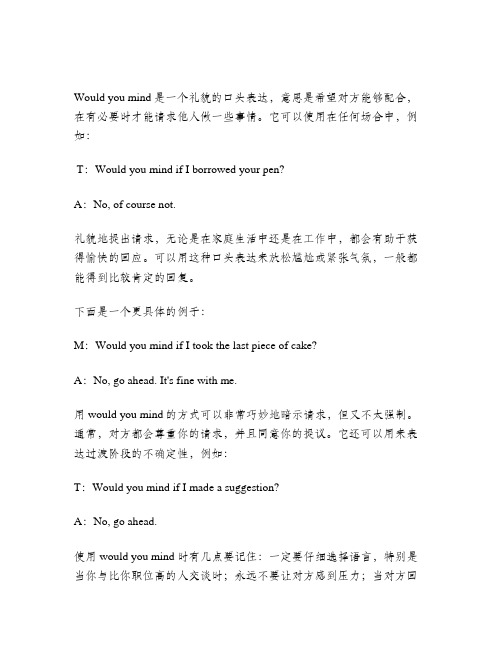
Would you mind是一个礼貌的口头表达,意思是希望对方能够配合,在有必要时才能请求他人做一些事情。
它可以使用在任何场合中,例如:T:Would you mind if I borrowed your pen?A:No, of course not.礼貌地提出请求,无论是在家庭生活中还是在工作中,都会有助于获得愉快的回应。
可以用这种口头表达来放松尴尬或紧张气氛,一般都能得到比较肯定的回复。
下面是一个更具体的例子:M:Would you mind if I took the last piece of cake?A:No, go ahead. It's fine with me.用would you mind的方式可以非常巧妙地暗示请求,但又不太强制。
通常,对方都会尊重你的请求,并且同意你的提议。
它还可以用来表达过渡阶段的不确定性,例如:T:Would you mind if I made a suggestion?A:No, go ahead.使用would you mind时有几点要记住:一定要仔细选择语言,特别是当你与比你职位高的人交谈时;永远不要让对方感到压力;当对方回答负面时,要尊重他的答案。
使用固定的格式表达would you mind彰显出你的礼貌和尊重,而且还可以增进沟通的效率。
一开始,也许当你说出would you mind时,有些紧张是正常的。
然而,随着使用的次数增加,你会发现这句礼貌的话语是可以改善你与他人关系的好手段。
总结Would you mind是一种礼貌的口头表达,意思是请求对方配合。
它可以用于家庭场景,工作场合,也可用于放松尴尬或紧张气氛。
使用would you mind来提出请求或表达不确定性时,要注意避免给对方施加压力。
只要我们用得当,它将是一种佳妙的人际交往工具。
mind的用法及搭配
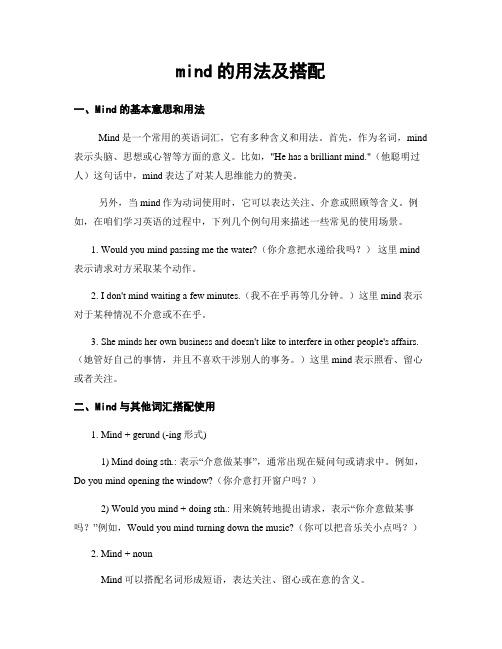
mind的用法及搭配一、Mind的基本意思和用法Mind是一个常用的英语词汇,它有多种含义和用法。
首先,作为名词,mind 表示头脑、思想或心智等方面的意义。
比如,"He has a brilliant mind."(他聪明过人)这句话中,mind表达了对某人思维能力的赞美。
另外,当mind作为动词使用时,它可以表达关注、介意或照顾等含义。
例如,在咱们学习英语的过程中,下列几个例句用来描述一些常见的使用场景。
1. Would you mind passing me the water?(你介意把水递给我吗?)这里mind 表示请求对方采取某个动作。
2. I don't mind waiting a few minutes.(我不在乎再等几分钟。
)这里mind表示对于某种情况不介意或不在乎。
3. She minds her own business and doesn't like to interfere in other people's affairs. (她管好自己的事情,并且不喜欢干涉别人的事务。
)这里mind表示照看、留心或者关注。
二、Mind与其他词汇搭配使用1. Mind + gerund (-ing形式)1) Mind doing sth.: 表示“介意做某事”,通常出现在疑问句或请求中。
例如,Do you mind opening the window?(你介意打开窗户吗?)2) Would you mind + doing sth.: 用来婉转地提出请求,表示“你介意做某事吗?”例如,Would you mind turning down the music?(你可以把音乐关小点吗?)2. Mind + nounMind可以搭配名词形成短语,表达关注、留心或在意的含义。
1) Mind your own business: 相当于“管好你自己的事情”。
would you mind的用法
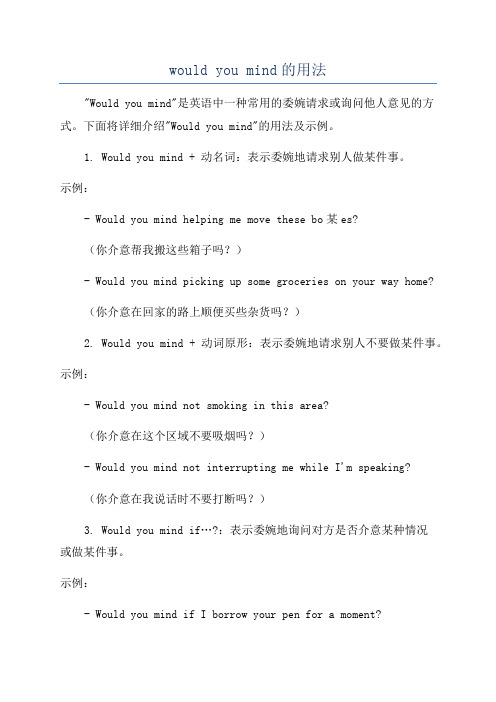
would you mind的用法"Would you mind"是英语中一种常用的委婉请求或询问他人意见的方式。
下面将详细介绍"Would you mind"的用法及示例。
1. Would you mind + 动名词:表示委婉地请求别人做某件事。
示例:- Would you mind helping me move these bo某es?(你介意帮我搬这些箱子吗?)- Would you mind picking up some groceries on your way home?(你介意在回家的路上顺便买些杂货吗?)2. Would you mind + 动词原形:表示委婉地请求别人不要做某件事。
示例:- Would you mind not smoking in this area?(你介意在这个区域不要吸烟吗?)- Would you mind not interrupting me while I'm speaking?(你介意在我说话时不要打断吗?)3. Would you mind if…?:表示委婉地询问对方是否介意某种情况或做某件事。
示例:- Would you mind if I borrow your pen for a moment?(你介意我借用你的笔一下吗?)(你介意我们把会议时间改到明天吗?)4. Would you mind + 宾语从句:表示委婉地询问对方是否介意某种情况或做某件事。
示例:- Would you mind if I took a day off ne某t week?(你介意我下周请一天假吗?)- Would you mind telling me your opinion on this matter?(你介意告诉我你对这件事的意见吗?)需要注意的是,"Would you mind"通常用于正式场合或与他人保持一定距离的情况下,以表达请求时的礼貌和谦逊。
mind用法

mind 用法如下:一、"mind" 用作名词时,意为“思想” 、“想法”、“头脑”、“智力”。
常见的含名词mi nd的短语有:cha nge on e's min d(改变主意),make up on e's mind(下定决心),keep in mind(记在心里),come into one' s mind(计上心来)等。
二、"mind"用作动词时,意为“介意”、“反对”,常用来表示委婉、客气的请求。
1、“ Would / Do you mind doing ... ?意为“..... 你介意吗?” 。
例如:Would you mind closing the door ?关上门好吗?2、“ Would / Do you mind + 人称代词宾格或形容词性物主代词+ doing ... ?” 意为“某人做某事,你介意吗?” 。
例如:Do you mind my closing the window ?(= Do you mind if I close the window ?)我把窗户关上,你介意吗?3、构成“ Would you mind doing ... ?” 的否定式时,通常在doing 的前面加not 。
例如:Would you mind not swimming in the river ?4、“ Would you mind ... ?” 后面接从句时,从句中的谓语动词常为过去式,用来表示委婉的语气。
例如:Would you mind if I closed the window ?你介意我把窗户关上吗?5、“ Would you mind ... ?” 的同义句式是“ Do you mind ... ?”。
二者表达相同的意思,只是“ Would you mind ... ?” 比“ Do you mind ... ?” 语气显得更客气一些。
wouldyou的含义和用法

wouldyou的含义和用法“wouldyou”是一个英语词汇,是“would you”的简写形式,意为“你愿意吗”,常用于口头交流和书面交流中。
在不同的情境中,它可表达不同的含义和意图。
本文将详细阐述“wouldyou”的含义和用法。
一、询问意愿最基本的含义是询问对方是否愿意做某事。
比如:“Wouldyou like to go to the movies with me on Saturday?” (你周六愿意跟我去看电影吗?)“Wouldyou mind opening the door for me?” (你介意给我开门吗?)“Wouldyou be willing to help me move these boxes?” (你愿意帮我搬这些箱子吗?)二、提出建议除了询问意愿之外,用“wouldyou”也可以作为提出建议的方式。
比如:“Wouldyou like to try this new restaurant?”(你想去试试这家新餐厅吗?)“Wouldyou c onsider taking a break?”(你考虑休息一下吗?)在这些情境下,“wouldyou”通常以一种温和而建议的方式来鼓励对方做出一些决策或行动。
三、表示假设“If we had more time, wouldyou like to go on a trip?”(如果我们有更多时间,你想去旅游吗?)“If you were lost in the forest, wouldyou build a shelter?”(如果你迷路了,在森林里你会搭建一个避难所吗?)在这些情境下,“wouldyou”强调了某种假设的情况,引导对方思考假设发生的结果或选择。
四、表示礼貌在日常交流中,“wouldyou”还可以用来表示礼貌。
比如:“Wouldyou like some coffee?”(要喝点咖啡吗?)“Wouldyou mind passing me the salt?”(帮我递一下盐好吗?)在这些情境下,“wouldyou”常常用于场合中更加礼貌的交流和询问,以展示对对方的尊重和关注。
mind用法
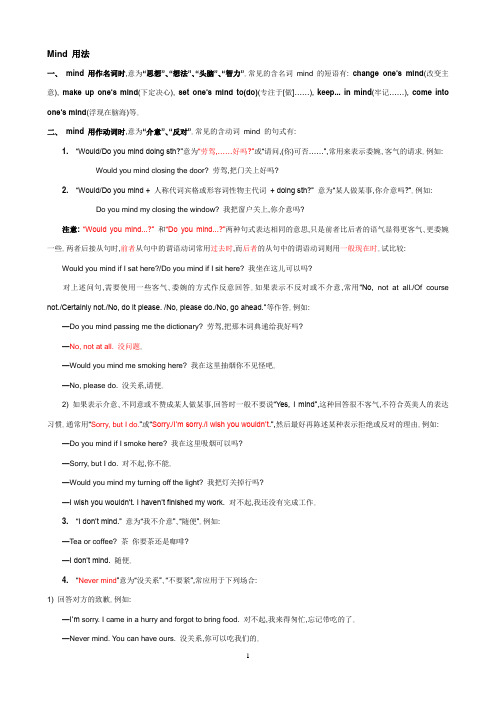
Mind 用法一、mind 用作名词时,意为“思想”、“想法”、“头脑”、“智力”。常见的含名词mind 的短语有: change one’s mind(改变主意), make up one’s mind(下定决心),set one’s mind to(do)(专注于[做]……), keep... in mind(牢记……), come into one’s mind(浮现在脑海)等。二、mind 用作动词时,意为“介意”、“反对”。常见的含动词mind 的句式有:1. “Would/Do you mind doing sth?”意为“劳驾,……好吗?”或“请问,(你)可否……”,常用来表示委婉、客气的请求。例如:Would you mind closing the door? 劳驾,把门关上好吗?2.“Would/Do you mind + 人称代词宾格或形容词性物主代词+ doing sth?” 意为“某人做某事,你介意吗?”。例如:Do you mind my closing the window? 我把窗户关上,你介意吗?注意: “Would you mind...?”和“Do you mind...?”两种句式表达相同的意思,只是前者比后者的语气显得更客气、更委婉一些。两者后接从句时,前者从句中的谓语动词常用过去时,而后者的从句中的谓语动词则用一般现在时。试比较: Would you mind if I sat here?/Do you mind if I sit here? 我坐在这儿可以吗?对上述问句,需要使用一些客气、委婉的方式作反意回答。如果表示不反对或不介意,常用“No, not at all./Of course not./Certainly not./No, do it please. /No, please do./No, go ahead.”等作答。例如:—Do you mind passing me the dictionary? 劳驾,把那本词典递给我好吗?—No, not at all. 没问题。—Would you mind me smoking here? 我在这里抽烟你不见怪吧。—No, please do. 没关系,请便。2) 如果表示介意、不同意或不赞成某人做某事,回答时一般不要说“Yes, I mind”,这种回答很不客气,不符合英美人的表达习惯。通常用“Sorry, but I do.”或“Sorry./I’m sorry./I wish you wouldn’t.”,然后最好再陈述某种表示拒绝或反对的理由。例如: —Do you mind if I smoke here? 我在这里吸烟可以吗?—Sorry, but I do. 对不起,你不能。—Would you mind my turning off the light? 我把灯关掉行吗?—I wish you wouldn’t. I haven’t finished my work. 对不起,我还没有完成工作。3. “I don’t mind.” 意为“我不介意”、“随便”。例如:—Tea or coffee? 茶你要茶还是咖啡?—I don’t mind. 随便。4. “Never mind”意为“没关系”、“不要紧”,常应用于下列场合:1) 回答对方的致歉。例如:—I’m sorry. I came in a hurry and forgot to bring food. 对不起,我来得匆忙,忘记带吃的了。—Never mind. You can have ours. 没关系,你可以吃我们的。2) 安慰对方。例如:—Did you watch the baseball match yesterday? 昨天你看棒球比赛了吗?—No, I missed it. By the time I got there, it had already finished. 没有,我错过了。当我到达那里时,比赛已经结束了。—Never mind. It was a boring match. 没关系。那是一场枯燥乏味的比赛。3) 回答对方的求助。例如:—Sorry to trouble you. 抱歉,麻烦您一下。—Never mind. What can I do for you? 没关系。我能为你做些什么呢?[链接中考]1. Would you mind_____more slowly? I can’t follow you.A. speakB. spokeC. spokenD. speaking2. Do you mind_____the radio a little bit? I am doing my homework.A. turning offB. to turn downC. turning downD. turning up3. —Would you mind opening the window?—_____.A. Of course, open itB. Not at allB. CertainlyC. No, don’t do it4. —Do you mind if I take the seat?—_____. It’s for a gentleman name d Bill.A. Better notB. Never mindC. Of courseD. Not at all5. —It’s too hot. Would you mind my_____the window?—_____. Do it as you like, please!A. to open; OKB. opening; Certainly notC. closing; Of courseD. open; Good idea6. —Would you mind my smoking here?—_____.A. Not at allB. I have no ideaC. Yes, please7. Would you mind_____me how_____English words?A. tell; to rememberB. telling; rememberC. telling; to rememberD. tell; remember8. —Mary is ill. When shall we go to see her, tonight or tomorrow night?—_____. Either night is OK.A. I’m sureB. I’m afraid notC. I don’t knowD. I don’t mind9. —I’m terribly sorry to have stepped on your foot.—_____.A. Don’t say thatB. Never mindC. You’re welcomeD. That’s right10. —Do you mind opening the door for me?—_____.A. Yes, of course notB. Yes, pleaseC. No, of course notD. No, you can’t open itKey:1-5 DCBAB6-10 ACDBC。
wouldyoumind的用法
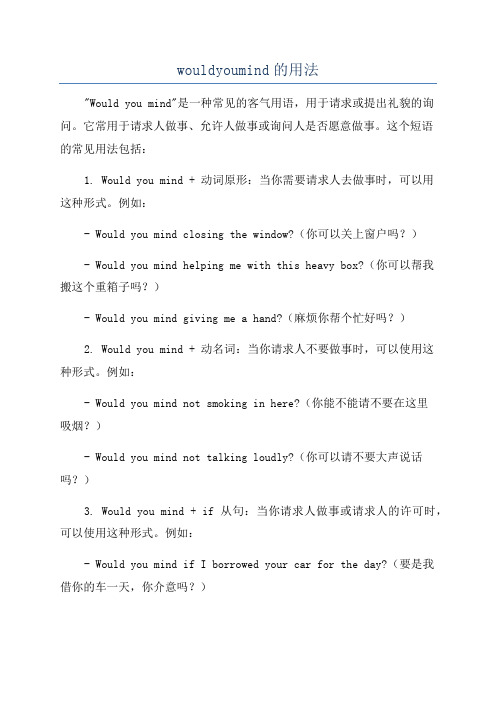
wouldyoumind的用法"Would you mind"是一种常见的客气用语,用于请求或提出礼貌的询问。
它常用于请求人做事、允许人做事或询问人是否愿意做事。
这个短语的常见用法包括:1. Would you mind + 动词原形:当你需要请求人去做事时,可以用这种形式。
例如:- Would you mind closing the window?(你可以关上窗户吗?)- Would you mind helping me with this heavy box?(你可以帮我搬这个重箱子吗?)- Would you mind giving me a hand?(麻烦你帮个忙好吗?)2. Would you mind + 动名词:当你请求人不要做事时,可以使用这种形式。
例如:- Would you mind not smoking in here?(你能不能请不要在这里吸烟?)- Would you mind not talking loudly?(你可以请不要大声说话吗?)3. Would you mind + if从句:当你请求人做事或请求人的许可时,可以使用这种形式。
例如:- Would you mind if I borrowed your car for the day?(要是我借你的车一天,你介意吗?)- Would you mind if we came a bit later?(要是我们晚到一点,你介意吗?)4. Would you mind + 代词/名词:当你请求人同意你做事时,可以使用这种形式。
例如:需要注意的是,问句中的“you”可以换成其他人称代词,如“he/she/they”,而且根据上下文的具体情况,可以调整句子的语气,使其更加礼貌或委婉。
下面是一些例句,来帮助你更好地理解和掌握“would you mind”的用法。
1. Would you mind closing the door? It's a bit chilly in here.(你可以关上门吗?这里有点冷。
wouldyoumind四种用法例句

Would you mind四种用法例句
would you mind的用法如下:
1.would you mind后面一般接的是动词的进行式,也就是would you mind+doing sth。
例句:Would you mind looking after my dog when I’m out?
意思是:我外出的时候,你是否介意帮我照看一下我的狗?
2.would you mind+名词宾格或是形容词性物主代词+doing sth。
Would you mind me listening to music now?
意思是:你介意我现在听音乐吗?
3.would you mind +if从句。
例句:Would you mind if I watch TV?
意思是:你介意我看电视吗?
4.would you mind 句型通常用于面对陌生人或是较为正式的场合,用于表达委婉以及客气的主观意愿,不是用在面对朋友,或是较为普通、随意的场合。
注意:would you mind后面不能接不定式,也就是to do。
wouldyoumind后面加什么

wouldyoumind后⾯加什么would you mind后⾯接动词-ing形式。
would you mind意思是“你介意…吗;你介不介意”。
Do (Would) you mind if句型⽤来表⽰请求对⽅的许可,即询问对⽅是否介意说话⼈做某事。
⽤Do开头时表⽰说话⼈⽐较直率;⽤Would开头时则表⽰说话⼈语⽓较为委婉。
will与would⽤法完全归纳1、表⽰意愿will和would均可表⽰意愿,will⽤于指现在的意愿,would⽤于指过去的意愿。
如:I’ll do anything that I can. 我愿做我能够做的任何事。
He will do anything except cook. 他什么都愿做,就是不愿做饭。
He asked if I would show him the way. 他问我是愿意可以给他带路。
按英语语法习惯,在条件状语从句中不能直接使⽤将来时态,⽽应⽤⼀般现在时表⽰将来意义,但表⽰“意愿”的will和would有时可⽤于条件句中。
如:If you will wait a moment, I’ll fetch the money. 如果你能等⼀下,我就取钱去。
If he would try harder, I’m sure he’ll do well. 只要他能再努⼒⼀些,我相信他会做好的。
条件状语从句will的意思不是“将要”,⽽是“愿意”。
注意,有时翻译可能会⽐较灵活,尤其是当⽤于if you will…这类结构时。
如:If you will [would] follow me, I’ll show you the way. 请跟我来,我给你指路。
If you will [would] wait a moment I’ll see if Mr Jones is free. 请您稍候⽚刻,我看看琼斯先⽣是否有空。
2、表⽰拒绝愿意做某事的反⾯是什么?就是拒绝。
表示委婉请求的英语句子语录带翻译

表示委婉请求的英语句子语录带翻译委婉语是一种普遍的语言现象,是日常交际中改善交际效果、维持和谐人际关系的重要手段。
下面是店铺带来的表示委婉请求的英语句子,欢迎阅读!表示委婉请求的英语句型篇一1. Would you mind + doing …? 你介意……吗?请你……可以吗?需注意:mind + doing(为动名词)。
动名词的否定式由“not + 动名词”构成。
即Would you mind not doing…?请不要……好吗?例如:Would you mind moving your bike? 请把你单车挪动一下好不好?---Would you mind cleaning your room? 打扫房间你介意吗?---I am sorry. I’ll clean it in a minute. 对不起,我马上就去做。
---Would you mind not wearing the old jeans? 不穿旧的牛仔裤好吗?---OK, I’ll put on another pair. 好,我将穿另一条。
---Would you mind not playing football here?请不要在这儿踢足球好吗?---I’m sorry. 对不起(当然不介意)。
2. would的常用句型:would作为情态动词,主要用于第二人称的疑问句中,表示询问对方的意愿或者向对方提出请求,时间指现在或者将来。
would的语气要比will更加婉转和客气。
常用的句型除“Would you mind doing…?”之外,还有:1. Would you please…? 请……可以吗?2. Would you like…? 需要……吗?3. Would you like to…? 你愿意……吗?4. Could you please do something? 请你做某事可以吗?5. What about doing …? ……怎么样?6. Shall we do …? 我们做……吧?7. You’d better do…. 你最好做……。
- 1、下载文档前请自行甄别文档内容的完整性,平台不提供额外的编辑、内容补充、找答案等附加服务。
- 2、"仅部分预览"的文档,不可在线预览部分如存在完整性等问题,可反馈申请退款(可完整预览的文档不适用该条件!)。
- 3、如文档侵犯您的权益,请联系客服反馈,我们会尽快为您处理(人工客服工作时间:9:00-18:30)。
Answers
• 对Woulind 的回答,也就是说,若 同意对方的请求,应用 not mind(不介 意),若不同意对方的请求,则用 mind(介意)。通常的回答方式有
1. 表示同意(即不介意)的答语:
• • • • • • No, that’s all right. 不介意,没关系。 No, go ahead, please. 不介意,请……吧。 Certainly not. 当然不介意。 Of course not. 当然不介意。 No, not at all. 一点也不介意。 No, I don’t mind at all. 一点也不介意。
2. 表示不同意(即介意)的答语:
• Yes, I do mind. 是的,我介意。 • Please don’t. 请别…… • Better not, please. 请最好不要……
• A: Do you mind shutting the door? 请你关 上门好吗? • B: Certainly not. 好的。 • A: Would you mind taking part? 请你参加 你介意吗? • B: No, I’d love to. 不介意,我很愿意参加。 • A: Would you mind if I smoked ? 我抽烟你 介意吗? • B: Oh, please don’t. 噢,请不要抽。
